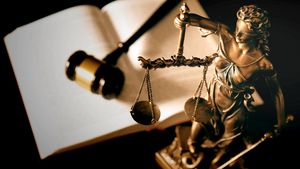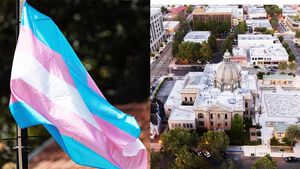Photo: Shamim Nakhai
Ah, love. Or blossoming love. Or hookups. Regardless of how it functions, everyone in an LGBT relationship deserves to feel like their relationship is just as respected as a straight one would be, right?
Sometimes, though, things get messy because our language is exclusive, and we generally aren’t taught how to talk about LGBT couples. Whether you’re straight or you identify as queer, we can all use a little advice when it comes to how to better support our besties and loved ones in LGBT relationships.
1. Switch up your language
This is one of the easiest ways to be more inclusive of LGBT friends. Asking "hook up with any hotties last night?" instead of "hook up with any hot boys/girls last night?" is a swap that sounds natural and supports any hookup, regardless of gender.
Plus, you still get the steamy deets, which is what we’re all really interested in.
2. Leave room for fluidity
It can be easy to expect friends who have come out to you as gay to always be gay, or to expect friends who’ve come out as lesbians to always be lesbians. But, as you already know, sexuality is fluid. A friend who may identify as gay one year may come to identify as bisexual, and a friend who identifies as a lesbian may come to prefer the term “queer.”
The same goes for relationships. Your favorite lesbian couple (complete with hashtags and Snapchat art signaling their status as your true fave) could end up being your favorite queer couple.
3. Avoid questioning bi and pan friends in “straight” relationships
Although the LGBT community still has a long way to go, we’re finally starting to be more inclusive of bisexuality, and pansexuality is also starting to get more and more acknowledged. But we still talk about “straight” relationships as something that bi and pan people can be in, which doesn’t exactly make sense.
Think about it: your bisexual, cis female bestie may end up in a relationship with a straight, cis dude, but she’s still bisexual. Just like a queer person is queer whether they’re dating someone or not, and a trans person is still trans whether they’ve decided to make any sort of transition or not.
4. Do your research
If your friend is dating someone new who identifies as something you’ve never even heard of, pull out that phone and get to Googling. Remember in The L Word when the infamous Jenny came home with Max, who was, at the time, a butch lesbian named Moira? Jenny’s friends were totally confused when Max came out as Max and said he was trans, and they mocked Max and Jenny’s relationship. They just weren’t sure how to handle it.
Now we’re in the age of technology, with loads of awesome queer media, minimal flares (sorry, Shane), and no excuses. Do your research so you don’t end up stepping on toes, and harming blossoming relationships. Because we all just wanna see our friends be in love, right?
5. Keep away from shoving partners into categories
Femme. Butch. Stud. Top. Bottom. Some of us feel badass when we’re recognized by these labels, but others feel suffocated by them. Unless they use the terms first, avoid playing the who’s-the-x-and-who’s-the-y game. The last thing you want is for the couple to begin talking about how rude you were as soon as you leave the room.
Plus, it gets a little too close to the way some straight people try to designate one person as the man and the other as the woman. Ew. Avoid at all costs!
Have ideas of your own? Tweet us, @pride_site!































































































































